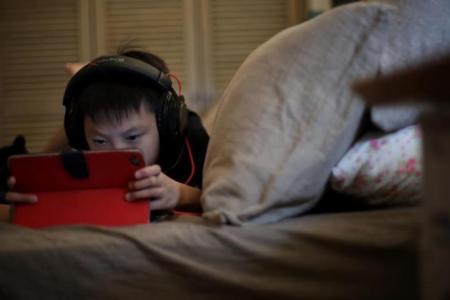Call for parents to go beyond just protection and prepare kids against online grooming, pornography
While parents should protect their children against online risks such as online grooming, sexting and pornography, they should also prepare the youngsters for encounters with such issues, said Associate Professor Daniel Fung, chief executive of the Institute of Mental Health.
This comes amid a surge in the number of children exposed to inappropriate sexual content with the prevalence of digital devices to view such material, said Prof Fung on Tuesday night (Feb 8). He was speaking at a webinar that addressed parental concerns of online harms.
Noting that it is almost impossible to regulate pornography on the Internet, Prof Fung said parents should help children understand that such content exists and why it is not good to watch it.
Clarifying his remarks on Wednesday, Prof Fung said teenagers, especially, can be quite curious about pornography and gain access to such content.
Instead of treating it as a taboo topic, parents can take the opportunity to discuss with them, explain what pornography is and why it is harmful, he added.
Watching pornography is not illegal in Singapore, but it is illegal to import, make, possess or download pornographic materials.
He said: "From a values perspective, it teaches very wrong values, very demeaning values about women and girls.
"Pornography potentially can become a source of a very skewed view of what relationships are all about... What's worse is you could also get addicted to it."
Citing a 2018 Organisation for Economic Cooperation and Development report, he highlighted the growing problem of young children exposed to sexual content online early on, with more than 30 per cent of those surveyed in 2017 reporting that they had encountered such material online. The figure was about 10 per cent in 2010.
Prof Fung was part of a four-person panel at the webinar organised by the Sunlight Alliance for Action (AfA), a cross-sector alliance that tackles online dangers, especially those targeted at women and girls. The other three panellists comprised representatives from Facebook owner Meta, the Media Literacy Council and non-profit Touch Cyber Wellness.
More than 180 participants, including parents and educators, joined the webinar held in conjunction with Safer Internet Day - a global event to raise awareness of emerging online issues and concerns - which fell on Tuesday.
Comparing protecting children against online harms to a house being secured with 10,000 locks, he said: "If you forget to lock (the padlocks), the thief can still get in, or if the person in the house wants to get out, they will just unlock all your locks."
As children grow into teenagers, their parents' attempts can also be seen as overprotective, Prof Fung noted.
Adolescents need to be aware of both the risks and benefits of the digital world and how to use technology respectfully, responsibly, safely and in a manner that can develop positive relationships, he said.
The head of Touch Cyber Wellness - which advocates cyber wellness and new media literacy for children, teenagers, parents and educators - Joanne Wong said that, with young children playing online games, another area of concern that has emerged over the past few years is their in-game interactions with strangers.
Some young children may not know how to discern what information they can share with fellow gamers, she observed.
For instance, her nephew playing the online game Roblox nearly gave away the password to his account in exchange for allegedly promised in-game currency from another player, she said.
Speaking at the virtual event, Ms Rahayu Mahzam, Parliamentary Secretary for Communications and Information, said Singapore "may need to update some of our laws" on technology amid an international convergence on how to regulate the Internet better.
Ms Rahayu, who is the co-chair of Sunlight AfA, which was set up in July last year by the Ministry of Communications and Information, noted that with the Covid-19 pandemic and the push to use technology especially in schools, online issues are "becoming very real".
The next webinar on March 25 will be targeted at young people. Details of the event will be released at a later date.
Get The New Paper on your phone with the free TNP app. Download from the Apple App Store or Google Play Store now


